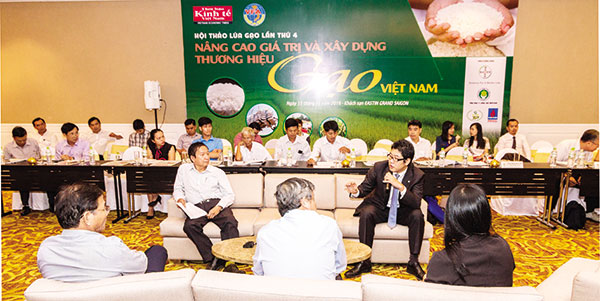Bayer thinks creatively on rice solutions
 |
| The symposium’s speakers and delegates joined forces to find creative measures for improving Vietnamese rice quality and brand positioning |
The company has been the key sponsor of the annual Rice Symposium, organised by the Vietnam Economic Times. Themed “How to Enhance Vietnamese Rice Quality and Brand Positioning to Meet Market Needs”, the 4th Rice Symposium gathered more than 150 delegates representing key stakeholders across public and private sectors nationwide, including government bodies such as the Party Central Committee Commission for Economics, the Ministry of Agriculture and Rural Development, the Vietnam Food Association, agricultural and scientific institutions, and rice value chain partners.
The symposium was organised to address the significant challenges that farmers of rice and other crops are facing, such as severe drought and high salinity intrusion due to climate change. And Vietnamese firms have to sell its wares in a tighter export market.
“Bayer is committed to tackling farming challenges with high value seeds, innovative crop protection solutions and services for modern and sustainable agriculture. We at Bayer believe that the challenges will be best addressed and solved in a close co-operation among all stakeholders,” said Kohei Sakata, general director of Bayer Vietnam, one of the keynote speakers at the symposium.
“This is why Bayer supports the idea of this Rice Symposium to further engage in dialogue with all key stakeholders in the sector – not only to acknowledge the issues of agriculture in Vietnam, but more importantly introduce concrete innovative solutions to help Vietnamese farmers overcome these challenges and thereby intensify agricultural production in a sustainable way,” he added.
 |
In 2016, Vietnam’s rice industry has faced many challenges. A severe drought earlier in the year resulted in high salinity levels in the Mekong Delta, raising concerns over the delta’s future. Rice production fell by 1.1 million tonnes according to the United Nations’ Food and Agriculture Organization (FAO). In addition, Vietnam’s rice export is estimated to drop to 5.65 million tonnes in 2016, down 14 per cent against the previous year – and 800,000 tonnes lower than initially forecast.
Since 2014, Bayer Vietnam has developed and implemented its four-point action plan as a holistic approach to deal with farming challenges in Vietnam. The plan includes leading innovation to address the key challenges of rice farming; enabling farmers by providing them with tools, technology, and training; raising agricultural productivity in an environmentally-compatible and sustainable manner; and expanding partnerships across the rice value chain, and between the public and private sectors.
At the Rice Symposium, Bayer Vietnam showed newly developed solutions for Vietnamese farmers to overcome challenges from climate change and to improve rice quality and yields. The company’s effort to strengthen the public-private partnership across the rice value chain was also highlighted.
Bayer Vietnam, in partnership with the Cuu Long Rice Research Institute, introduced an innovative solution which helps farmers to manage weeds more effectively – called the Dry Direct Seeding Technology. This technology is considered an alternative crop establishment method for rice, where seeds are sown directly into dry soil without raising them in a nursery. After being sown, the dry seeds can remain viable in dry soil from 15 to 20 days. They then will germinate with the first significant rain.
Bayer Vietnam has also launched two new rice varieties to meet the rising demand for diversified rice breeds and pressure from climate change.
“We are proud to offer BTE1 and TEJ Vang hybrid rices to Vietnamese farmers. Due to heterosis, these hybrid rices have significant advantages over in-bred rice. They offer up to 20 per cent higher yields, higher tolerance towards biotic stresses, and stronger root systems for better water and nitrogen-use efficiency,” said Sakata.
What the stars mean:
★ Poor ★ ★ Promising ★★★ Good ★★★★ Very good ★★★★★ Exceptional
Latest News
More News
- State corporations poised to drive 2026 growth (February 03, 2026 | 13:58)
- Why high-tech talent will define Vietnam’s growth (February 02, 2026 | 10:47)
- FMCG resilience amid varying storms (February 02, 2026 | 10:00)
- Customs reforms strengthen business confidence, support trade growth (February 01, 2026 | 08:20)
- Vietnam and US to launch sixth trade negotiation round (January 30, 2026 | 15:19)
- Digital publishing emerges as key growth driver in Vietnam (January 30, 2026 | 10:59)
- EVN signs key contract for Tri An hydropower expansion (January 30, 2026 | 10:57)
- Vietnam to lead trade growth in ASEAN (January 29, 2026 | 15:08)
- Carlsberg Vietnam delivers Lunar New Year support in central region (January 28, 2026 | 17:19)
- TikTok penalised $35,000 in Vietnam for consumer protection violations (January 28, 2026 | 17:15)
















 Mobile Version
Mobile Version